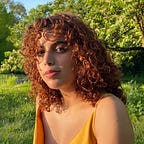From 14 to 23
The summer before I started high school, I found out my dad had cancer. Pain in his lower back, fatigue, and overall malaise came down to one diagnosis: multiple myeloma. For a family that is generally well-prepared, we were not. I was prepared to be starting a new stage in my life, and somehow excited to start high school (no idea why). I was not prepared for the weeks my father was going to spend hospitalized, undergoing intense treatments of chemotherapy along with a stem cell transplant. Neither was I prepared to begin what would be the pregame to my career in healthcare, as I suddenly had to become knowledgeable about insurance policies, social services, and the pathogenesis of his disease.
The capacity of the human body is incredible, and it has always interested the younger version of me. The intelligence that is disease manifestation was an unknown ground. Cancer, specifically, is a genius illness that creeps up on people in different ways. There is no one size fits all. Although we in the healthcare space have made progress in screening and treatment capacity, the reality is that there are gaps in research to be filled. We have too many questions, and new ones are added as we learn more about cancer.
Although I was able to grasp what was happening on a system level, my emotions never made sense to me. I never felt sad, but angry. While people expected his daughters to be filled with sadness, I can guarantee you I have spent more time enraged with this disease, the world, and the U.S healthcare system. It angered me when other people made his situation about themselves. Being able to gauge others’ intentions, I could immediately tell who was showing up for my dad because they cared versus who was showing up because it fed their ego. And by that, you know exactly what I mean. These are the folks who show up to be able to share with someone else what they did, ultimately showing how ”kind” they are. Thankfully, there was balance and genuine intentions with the individuals who did not behave this way. In essence, I took notes.
What I didn’t know is that I’d begin experiencing grief on top of anger every single day since then. Fear, pain, and constant worry. Watching this disease take apart my favorite parts of him -the strongest man in the world gradually has been my biggest heartbreak. I have him here, but I’m constantly grieving another part of him that has been taken away by this disease. It was not until I started going to therapy, something I truly should have been in before my father was diagnosed — that I learned about anticipatory grief. It’s exactly what it sounds like. Anticipatory grief is defined as grief before death. Grief before death often involves more anger, more loss of emotional control, and atypical grief responses. Even though he is alive, my heart and mind has been processing the loss from the moment I learned about his illness.
Fast forward to 2020, I am no longer 14 (darn). Yet again, cancer strikes and catches us when we have several blind spots. We have COVID-19, loss of loved family members, and complete quarantine limiting access to cancer screenings. On top of ensuring my father’s safety during a global pandemic given his immunocompromised state, we were informed of his cancer attacking again. This time, however, multiple myeloma became smarter than before. On top of new malignant lesions, his team of oncologists found complications impacting his neurological status. While we were doing our best to protect him from COVID-19, an illness that is likely to kill him if exposed — there was a blind spot.
This time, I’m in therapy and I’ve been able to pinpoint how my inner child feels with their support. The anger resurfaced, but it came with an additional feeling. I feel disappointed this time around, specifically with science. The complication associated with his disease, multiple myeloma is significantly rare. There have not been enough cases to foster a substantial prognosis. In other words, I cannot predict a single thing based on the scientific data available to me. At a loss, I did not know where to go for hope. Words only took me so far. In 2014, I was able to reel hope from science. In 2020, I had no choice but to reel hope from within myself.
By focusing on what I can control versus what I cannot, I have been able to stay strong through what others are watching and waiting for me to break down over. I can control the love and care I provide to my father and family, and I can control the changes I make as a leader in the healthcare system that we are firsthand experiencing. I can control the emotions I feel by allowing myself to experience them.
I can control much more than I cannot, and that has made all the difference a version of Francesca in 2014 truly needed.
